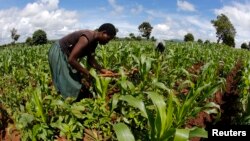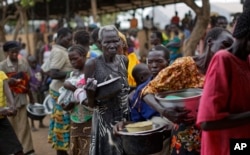A local organization that distributes seeds in South Sudan's Gbudue state wants the government to restrict international groups from importing seed into the country.
The nonprofit Global Agriculture Innovation & Solutions Ltd. (GAIS) works with 200 farmers across Gbudue.
GAIS Executive Director Mike Gaga says he does not understand why the Food and Agriculture Organization (FAO), a United Nations agency, imports seeds from other countries to distribute to farmers in Gbudue instead of buying local seeds from suppliers like his group.
“A hundred metric tons is the open tender from FAO and we applied. They said they were going to send us an inspection team [but] the inspection team never came," Gaga told VOA's "South Sudan in Focus" radio program. "To our surprise, we saw 100 metric tons of seeds imported to the state through Congo and we don’t know where it comes from.”
Gaga said his group produced about 150 metric tons of maize seeds, worth about $300,000.
'Promote the local companies'
He appealed to South Sudan's government to impose restrictions on seeds from outside sources, asking that it instead "promote the local companies who are producing seeds. We cannot build our country by importing.”
Mariano Erneo, director general of Gbudue’s Ministry of Agriculture, said he was surprised to learn that FAO has seeds from outside South Sudan.
“This is the first time I am hearing that FAO has brought seeds into the state from abroad," Erneo said. He said his ministry would find out details about the seeds, which he said were intended for a program for which the international agency had lined up a local NGO to administer.
The U.N. agency released a statement March 8 in which it said that "within the framework of the emergency response to prevailing food insecurity across the country, FAO supports vulnerable farmers by distributing crop seeds and tools for use in the main agricultural season.”
FAO says it does this in two ways: by distributing seeds purchased by FAO and by distributing inputs through seed fairs at which it provides cash support to beneficiaries to buy seeds from the local market.
Support for local growers
The FAO insists that making local seed available to farmers is a priority.
Serge Tissot, FAO’s country representative in South Sudan, said the agency organizes seed fairs at which local farmers bring their best seed and sell it to other farmers who need seed and the FAO pays for it.
"The procurement process of FAO follows international rules and it is an independent and transparent process,” Tissot told VOA.
Tissot said Gbudue's capital city, Yambio, is relatively peaceful, so FAO may plan to organize a seed fair there later this year.
He added that FAO has worked with the nonprofit GAIS since 2016.
“This company has already been supported by FAO in the past for the production of seeds but also for training and other activities," Tissot said.
FAO said that, for this year's main agricultural season, it has invited local suppliers registered with the Ministry of Agriculture and Food Security and other companies in the region to submit bids.
Waiver cited
The U.N. agency said that the ministry last year granted it a waiver to import maize seeds for the 2018 planting season because of South Sudan’s low seed production the previous year and widespread displacement of producers because of the ongoing conflict.
Tissot said FAO plans to distribute 5,000 metric tons of seed to farmers in South Sudan this year, substantially up from last year's 2,000 metric tons.







